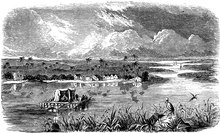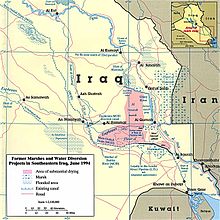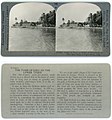Al-Qurnah
Al-Qurnah
القرنة | |
|---|---|
City | |
| Coordinates: 31°0′57″N 47°25′50″E / 31.01583°N 47.43056°E | |
| Country | |
| Governorate (muhafazat) | Basra Governorate |
| District | Al-Qurna District |
| Elevation | 16 ft (4 m) |
| Population (2018) | |
• Total | 286,073 |
| District total | |
| Time zone | UTC+3 (GMT +3) |
| • Summer (DST) | UTC+4 (GMT +4) |
Al-Qurnah (Kurnah or Qurna, meaning connection/joint in Arabic) is a town in southern Iraq about 74 km northwest of Basra, that lies within the conglomeration of Nahairat. Qurna is located at the confluence point of the Tigris and Euphrates rivers to form the Shatt al-Arab waterway.[2] Local folklore holds Qurnah to have been the original site of biblical paradise, the Garden of Eden, and location of the Tree of Knowledge.
History
[edit]
Local folklore holds Qurnah to have been the site of the Garden of Eden and the location of a city built by general Seleucus Nicator I.[3][4] An ancient tree is celebrated locally and shown to the tourists as the actual Tree of Knowledge of the Bible.[5] The tree died some time ago and replacement trees were planted. The tomb of Ezra is also described to be nearby and found further upstream on the river Tigris.[6][7]
In 1855, Al Qurnah was the site of the Qurnah Disaster, in which local tribes attacked and sank a convoy of a ship and rafts carrying 240 cases of antiquities discovered by Victor Place's mission to Khorsabad, Rawlinson's to Kuyunjik and Fresnel's to Babylon.[8][9] The loss of priceless antiquities was a notable disaster for those researching the antiquities of the region.[8][10] Subsequent efforts to recover antiquities lost in the Qurnah Disaster, including a Japanese expedition in 1971-2, were largely unsuccessful.[11]

The town experienced the Battle of Qurna during the Mesopotamian Campaign of World War I, when the British defeated Ottoman troops who had retreated from Basra in 1914.[12] The Battle of Qurna secured the British front line in Southern Mesopotamia, thereby protecting Basra and the oil refineries at Abadan in Persia (now Iran).[13]
In 1977, Thor Heyerdahl sailed a reed boat from al Qurnah to show that migration between Mesopotamia with the Indus Valley civilization was possible.[14][15] The voyage proved complicated because of the wars in the region and the vessel was eventually lost off Djibouti.[16][17]

After the First Gulf War (1991), the Iraqi government under Saddam Hussein diverted river water away from the local marshes causing them to become completely desiccated.[18] The wetlands have since shrunk to 58% of their pre-drainage area and are projected to drop below 50%.[19] This loss has also been a result of Turkish and Iranian damming of the Tigris and Euphrates rivers.[20][21] The UN has reported that the combined volume of these rivers has been reduced by 60%.[22] These developments are said to have made the area more vulnerable to degradation and desertification.[23]
Recent developments
[edit]
The river front Qurnah Tourist Hotel was built during the Ba'athist period to encourage tourism for the region.[24]
Majnoon Island near Al-Qurnah is a center for oil production of the giant Majnoon Oilfield. The area was built out of sand dunes and mud to create pathways for oil pipelines.[citation needed] The island was held by Iranian army during the Iran-Iraq war before Iraqi chemical weapons were deployed.[25]
As of the start of the 2003 US invasion of Iraq, conditions of the city were already reportedly woeful.[26][27] Cracked pavements and bullet holes in local properties, the looting of the local hospital[28] and the poor condition of the tree of knowledge[29] made the return of tourism to the area challenging.[30][31] The local economic, environmental and social conditions in Al-Qurnah district have since been described as fragile.[32]
Notable people
[edit]- Nuri Ja'far (1914 – 7 November 1991), psychologist and philosopher of education.[33]
Gallery
[edit]-
Basra area map.
-
Farm outside Al Qurnah
-
Shrine in Al Qurnah
-
Ezra's Tomb in Kurnah
-
Rafts used for transport on the River Tigris
-
Depiction of rafts (Keleks) loaded with antiquities that sank near Al Qurnah in 1855 (Victor Place, 1867)
See also
[edit]- Qurnah Disaster
- Battle of Qurna (1914)
- Operation Kheibar (1984)
- West Qurna Oil Field
- Draining of the Mesopotamian Marshes
- Ezra's Tomb
References
[edit]- ^ "Maps, Weather, and Airports for Al Qurnah, Iraq". Archived from the original on 2007-11-13. Retrieved 2007-12-13.
- ^ "Qurna, Iraq". Archived from the original on 2007-11-12. Retrieved 2007-12-12.
- ^ "Qurna, Iraq". www.atlastours.net. Archived from the original on 2020-06-26. Retrieved 2021-04-15.
- ^ "Seleucus I Nicator | Seleucid ruler". Encyclopedia Britannica. Retrieved 2021-05-21.
- ^ "The Tree of Knowledge". Atlas Obscura. Archived from the original on 2021-06-02. Retrieved 2021-04-11.
- ^ Yigal Schleifer. "History". www.dangoor.com. Archived from the original on 2016-03-03. Retrieved 2021-04-11.
- ^ "TOMB OF EZRA". The Complete Pilgrim - Religious Travel Sites. 2014-08-13. Archived from the original on 2021-04-11. Retrieved 2021-04-11.
- ^ a b Larsen, M.T., The Conquest of Assyria: Excavations in an Antique Land, Routledge, 2014, pp 344-9
- ^ Potts, D. T. "Potts 2020. 'Un coup terrible de la fortune:' A. Clément and the Qurna disaster of 1855. Pp. 235-244 in Finkel, I.L. and Simpson, St J., eds. In Context: The Reade Festschrift. Oxford: Archaeopress". Archived from the original on 2021-04-11. Retrieved 2021-04-11.
{{cite journal}}: Cite journal requires|journal=(help) - ^ Genç, Bülent (October 2021). "Memory of destroyed Khorsabad, Victor Place, and the story of a shipwreck". Journal of the Royal Asiatic Society. 31 (4): 759–774. doi:10.1017/S135618632100016X. ISSN 1356-1863.
- ^ Namio Egami, "The Report of The Japan Mission For The Survey of Under-Water Antiquities At Qurnah: The First Season," (1971–72), 1-45, https://www.jstage.jst.go.jp/article/orient1960/8/0/8_0_1/_pdf Archived 2018-10-31 at the Wayback Machine.
- ^ Reynolds, B. T. (1937). "The Battle of Qurna". The Military Engineer. 29 (164): 101–106. ISSN 0026-3982. JSTOR 44563856. Archived from the original on 2021-06-06. Retrieved 2021-04-09.
- ^ A.J. Barker, The First Iraq War, 1914–1918, Britain's Mesopotamian Campaign Archived 2021-06-06 at the Wayback Machine,(Enigma, New York, 2009; originally published in 1967 as The Bastard War(US)/The Neglected War(UK)), 36
- ^ Pathé, British. "Bahrain: Noted Explorer Thor Heyerdahl Prepares To Continue His Reed-Boat Voyage To India". www.britishpathe.com. Archived from the original on 2021-06-06. Retrieved 2021-04-30.
- ^ "Thor Heyerdahl's Tigris expedition - Rashad Salim". Google Arts & Culture. Archived from the original on 2021-04-30. Retrieved 2021-04-30.
- ^ "Thor Heyerdahl's expeditions". Thor Heyerdahl Instituttet. Archived from the original on 2021-04-30. Retrieved 2021-04-30.
- ^ "11.1 25 Years Ago Heyerdahl Burns "Tigris" Reed Ship to Protest War - Story by Betty Blair and Bjornar Storfjell Letter to UN by Thor Heyerdahl". www.azer.com. Archived from the original on 2021-05-07. Retrieved 2021-05-24.
- ^ The Iraqi Government Assault on the Marsh Arabs - A Human Rights Watch Briefing Paper Archived 2009-05-15 at the Wayback Machine January 2003(PDF) (Report). Human Rights Watch. January 2003. Retrieved June 20, 2018.
- ^ Al-Hilli, Majeed & Warner, Barry & Asada, Taro & Douabul, Ali. (2009). An assessment of vegetation and environmental controls in the 1970s of the Mesopotamian wetlands of southern Iraq. Wetlands Ecology and Management. Archived 2021-04-11 at the Wayback Machine 17. 207-223. 10.1007/s11273-008-9099-1.
- ^ "Turkey's Dam-Building Could Create New Middle East Conflict". The Maritime Executive. Archived from the original on 2021-04-11. Retrieved 2021-04-11.
- ^ ispiseo (2020-02-24). "Iran's Upstream Hegemony and Its Water Policies Towards Iraq". ISPI. Archived from the original on 2021-04-11. Retrieved 2021-04-11.
- ^ Ibrahim, Arwa. "Declining levels in Iraq's Tigris raise fear of water crisis". www.aljazeera.com. Archived from the original on 2021-04-11. Retrieved 2021-04-11.
- ^ Hamza, Kanar, "Desertification and political onstability in the Tigris and Euphrates River Basins" (2010). Masters Theses. 423. https://commons.lib.jmu.edu/master201019/423 Archived 2021-05-16 at the Wayback Machine
- ^ "War Takes Its Toll on the Garden of Eden". Archived from the original on 2007-11-29. Retrieved 2007-12-12.
- ^ Regencia, Ted. "Chemical attacks on Iran in the 1980s that US ignored". www.aljazeera.com. Archived from the original on 2021-04-16. Retrieved 2021-04-16.
- ^ "BBC - History - The Lost Palaces of Iraq". Archived from the original on 2016-01-22. Retrieved 2019-12-20.
- ^ "Al-Qurnah Hospital stripped bare". The New Humanitarian (in French). 2003-04-22. Archived from the original on 2021-04-11. Retrieved 2021-04-11.
- ^ "Al-Qurnah Hospital stripped bare". The New Humanitarian (in French). 2003-04-22. Archived from the original on 2021-04-11. Retrieved 2021-04-15.
- ^ "The Tree of Knowledge". Atlas Obscura. Archived from the original on 2021-06-02. Retrieved 2021-04-15.
- ^ e.thePeople : Article : The Legendary Garden of Eden Now a Wasteland[permanent dead link]
- ^ "The Lost Palaces of Iraq". www.bbc.co.uk. Archived from the original on 2016-01-22. Retrieved 2021-04-11.
- ^ "Prospects for resilience amid fragility: Conflict analysis of Al-Qurna and Al-Dair districts in Basra governorate | World Food Programme". www.wfp.org/. 2022-03-16. Retrieved 2024-03-07.
- ^ Al-Jaburi, Kamel Salman (2003). Mu'jam Al-Udaba' min Al-'Asr Al-Jahili Hatta Sanat 2002 معجم الأدباء من العصر الجاهلي حتى سنة 2002 [Dictionary of writers from the pre-Islamic era until 2002] (in Arabic). Vol. 6 (first ed.). Beirut: Dar Al-Kotob Al-Ilmiyah. p. 393.
External links
[edit]- Iraq Image Archived 2019-05-04 at the Wayback Machine - Al-Qurnah Satellite Observation
- The Capture of Qurna in 1914 - about the Battle of Qurna








